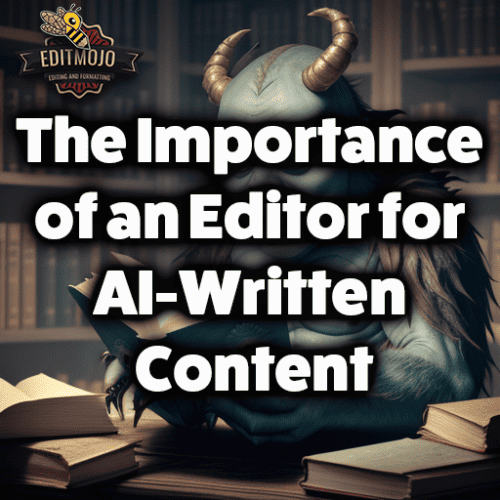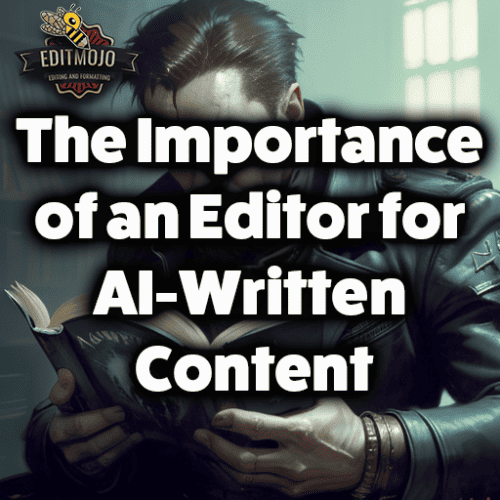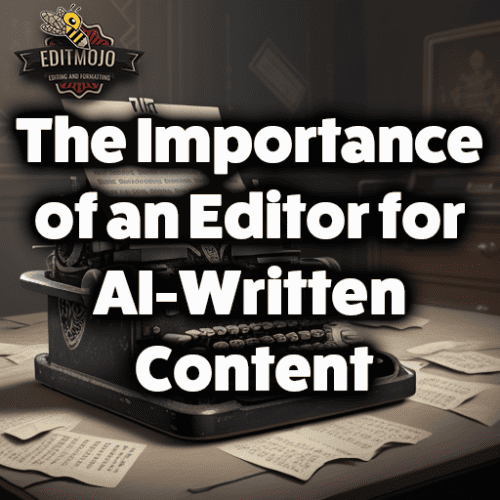The importance of an editor for AI-written content
The importance of an editor for AI-written content. The world of content creation has undergone a seismic shift with the advent of artificial intelligence (AI). AI has entered the realm of writing, ushering in a new era of machine-generated content that is efficient, consistent, and voluminous. Yet, the centuries-old role of the human editor still holds significant weight in this digital realm. As we merge the boundary between man and machine in the world of writing, the human editor’s role becomes more vital than ever.
Key Takeaways
| Point | Details |
|---|---|
| AI in Content Creation | AI uses models like NLG and ML to generate content that is efficient, consistent, and voluminous. |
| Limitations of AI | Despite its benefits, AI struggles with creativity, complex language nuances, and context. |
| Role of Human Editors | Editors ensure accuracy, add human touch and context, and overcome the limitations of AI. |
| Case Studies | Real-life examples, like GPT-3 and Heliograf, illustrate the necessity of human editing in AI-generated content. |
| Future of AI and Editors | The future will see a balance of AI and human intervention in content creation, with editors evolving from basic proofreaders to strategic content shapers and AI managers. |
Understanding AI in Content Creation
Before we delve into the necessity of human editing in AI-written content, it’s crucial to understand how AI creates content.
The Mechanics of AI Writing
AI writing primarily depends on advanced models such as Natural Language Generation (NLG) and Machine Learning (ML). More recent models, like GPT-4, have further revolutionized AI’s capacity in writing. These models analyze vast amounts of data and learn to generate human-like text, predicting the next word or phrase based on what they’ve seen before.
Benefits of AI-Written Content
AI has proved to be a game-changer in content generation. It creates content with unprecedented efficiency, freeing up human writers from time-consuming tasks. Moreover, it provides consistency, reducing the risk of human errors. Lastly, it can produce a staggering volume of content, far beyond human capacity.
Limitations of AI in Content Writing
Despite these benefits, AI-written content is not without its drawbacks. While AI can mimic human language, it lacks the creativity and originality that human writers bring. It also struggles to understand complex language nuances and context, which are second nature to human writers.
The Need for Human Editing in AI-Written Content
Given these limitations, it’s clear that AI-written content needs a human touch. This is where the role of an editor comes into the picture.
Ensuring Accuracy and Correctness
Human editors excel in ensuring the accuracy and correctness of content. They meticulously check spelling and grammar and are adept at fact-checking, ensuring the reliability of the content.
Adding Human Touch and Context
Editors also excel in adding a human touch and context to content. They incorporate emotional intelligence and cultural nuances into the text, something AI still grapples with.
Overcoming Limitations of AI
Finally, human editors are instrumental in overcoming the limitations of AI. They refine the language and tone, correct inaccuracies, and ensure alignment with the brand voice and strategy.

Case Studies and Real-Life Examples
Consider the case of OpenAI’s GPT-3, one of the most powerful AI language models to date. While it has created impressive content, it has also produced outputs with glaring inaccuracies. An article by Technology Review illustrated how GPT-3 failed to answer a simple question correctly due to its inability to interpret complex language. It’s in instances like these where the role of an editor becomes invaluable.
In another example, The Washington Post’s AI technology, Heliograf, which produced hundreds of articles during the 2016 Rio Olympics, still needed a human touch. The content, while factual, was often considered lacking in narrative depth and stylistic variety, showing the necessity of an editor’s intervention.
The Future of AI-Written Content and the Role of Human Editors
As AI continues to evolve, the role of human editors will also transform.
Evolving Role of Human Editors
Editors will no longer be basic proofreaders but strategic content shapers. They will need to upskill, learning to manage AI tools effectively. As I see it, the future editor will be a hybrid professional, blending human creativity with technological proficiency.
The Balance of AI and Human Intervention
The future of meaningful content creation lies in the balanced partnership between AI and human intervention. We cannot ignore the efficiency of AI, but at the same time, we can’t replace the depth and context a human mind brings.
The advent of AI in content creation does not eliminate the need for human editors. Instead, it amplifies it. It is the human editor who breathes life into AI-generated content, refining it and filling in the gaps that AI misses. In the era of AI-written content, the human editor is not becoming obsolete. They are becoming more vital than ever.
As we venture further into this digital era, we must consider the harmonious blend of AI and human touch in content creation. As readers, writers, and content creators, we must welcome AI tools while acknowledging the irreplaceable value of human editors. I invite you to share your experiences and thoughts about the balance between AI-written content and the role of human editors.

Beyond the AI and Human Binary
In this rapidly evolving digital landscape, it’s essential to step beyond the binary of AI versus human. Instead, it’s more productive to perceive AI as a tool that enhances human capabilities.
AI and Human Collaboration: A Symphony of Efficiency and Creativity
In the realm of content writing, AI and human collaboration can create a symphony of efficiency and creativity. AI can handle the heavy lifting of generating basic content structure, while humans, with their innate creativity and emotional intelligence, can add the finishing touches that make the content engaging and meaningful. This harmonious collaboration could be the future of content creation, with editors orchestrating this synergy.
Embracing the Change: The New Editor’s Role
Change can be daunting, but it also presents opportunities for growth. As AI becomes more integrated into content creation, editors need to embrace this change and adapt their roles accordingly.
Editors as Strategists and Storytellers
The new editor’s role will involve less manual correction and more strategic work. Editors will transition from proofreaders to content strategists, aligning the AI-written content with the brand’s voice, goals, and audience. They will become storytellers, using their creative skills to shape engaging narratives from the AI-generated content.
Editors as AI Managers
Editors will also become AI managers, harnessing the power of AI while managing its limitations. They will need to understand how AI models work to effectively guide them, creating content that aligns with their objectives.
Enhancing AI with Human Skills: The Editor’s Value
The editor’s value in the era of AI lies in their uniquely human skills. As machines learn to write, it’s the human ability to feel, interpret, and create that will make content truly resonate with the audience.
Empathy and Cultural Understanding
Editors can bring empathy and cultural understanding to the content, ensuring it is respectful, inclusive, and sensitive to the audience’s diverse backgrounds and experiences.
Critical Thinking and Creativity
Editors also bring critical thinking to the table, examining the AI-written content from different angles, asking questions, and making improvements. Their creativity can add sparkle to the content, infusing it with original ideas, compelling narratives, and engaging styles.

Final Thoughts (The importance of an editor for AI-written content)
As we move towards an AI-dominated future, we should not forget the value of human touch. Editors play a crucial role in this context, shaping and enhancing AI-written content. They are the bridge between man and machine, blending the efficiency of AI with the creativity and emotional depth of humans. The future of content creation will not be a choice between AI or human, but rather a harmonious collaboration between AI and human, orchestrated by the skilled human editor.
So, as we witness this exciting evolution, let’s continue the conversation about the importance of an editor in AI-written content. I’d love to hear your thoughts, experiences, and insights on this intriguing topic.
Top Five Questions and Answers
| Question | Answer |
|---|---|
| Why is human editing important for AI-written content? | Human editing is important for AI-written content to ensure accuracy, add human touch and context, and to overcome the limitations of AI. |
| What are the limitations of AI in content writing? | AI in content writing struggles with creativity, understanding complex language nuances, and context. |
| How is the role of an editor changing with the advent of AI? | The role of an editor is evolving from basic proofreading to strategic content shaping and AI management. |
| Can AI completely replace human writers and editors? | While AI can generate content efficiently, it cannot replace the creativity, emotional intelligence, and cultural understanding that human writers and editors bring to content creation. |
| What does the future hold for AI-written content and human editors? | The future of AI-written content and human editors lies in a harmonious collaboration, leveraging the efficiency of AI and the creativity and emotional depth of humans. |
Top Ten Resources and Further Reading
| Title | Keyword | Link |
|---|---|---|
| Understanding AI in Content Creation | AI Content Creation | Link |
| The Rise of AI in Writing | AI in Writing | Link |
| The Limitations of AI in Content Writing | Limitations of AI | Link |
| The Importance of an Editor in Traditional Writing | Role of an Editor | Link |
| Case Study: GPT-3 and Human Editing | GPT-3 | Link |
| Case Study: The Washington Post’s Heliograf | Heliograf | Link |
| The Future of AI and Human Editors | Future of AI and Editors | Link |
| The Role of Editors in the Digital Age | Digital Age Editors | Link |
| A Guide to AI and Content Strategy | AI and Content Strategy | Link |
| AI and Human Collaboration in Writing | AI and Human Collaboration | Link |
Fun Interactive Quiz
1. How does AI create content?
A. Through sheer luck
B. By manually inputting every sentence
C. Using advanced models like NLG and ML
D. AI doesn’t create content
2. What is a major limitation of AI in content creation?
A. It cannot process text
B. It struggles with understanding complex language nuances and context
C. It cannot work without electricity
D. It’s too creative
3. Why do we need human editors for AI-written content?
A. To turn on the AI machines
B. To add human touch and context, ensure accuracy, and overcome the limitations of AI
C. To do the AI’s job
D. Humans are not needed in the process
4. What does the future hold for human editors with the advent of AI?
A. They will become obsolete
B. They will become AI machines
C. They will transition from basic proofreaders to strategic content shapers and AI managers
D. They will have more free time
5. What is the ideal future of content creation?
A. Only AI-written content
B. Only human-written content
C. A balanced partnership between AI and human intervention in content creation
D. No more content creation
Here are the answers for the quiz:
1. How does AI create content?
Correct answer: C. Using advanced models like NLG and ML
2. What is a major limitation of AI in content creation?
Correct answer: B. It struggles with understanding complex language nuances and context
3. Why do we need human editors for AI-written content?
Correct answer: B. To add human touch and context, ensure accuracy, and overcome the limitations of AI
4. What does the future hold for human editors with the advent of AI?
Correct answer: C. They will transition from basic proofreaders to strategic content shapers and AI managers
5. What is the ideal future of content creation?
Correct answer: C. A balanced partnership between AI and human intervention in content creation
